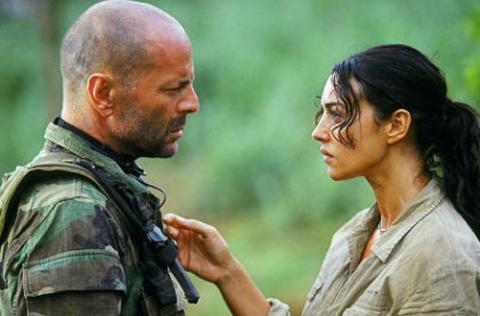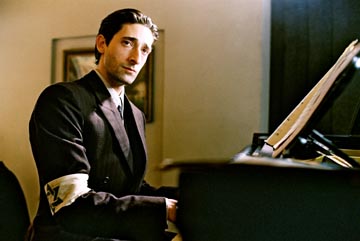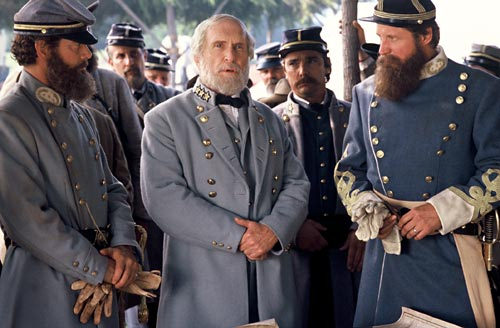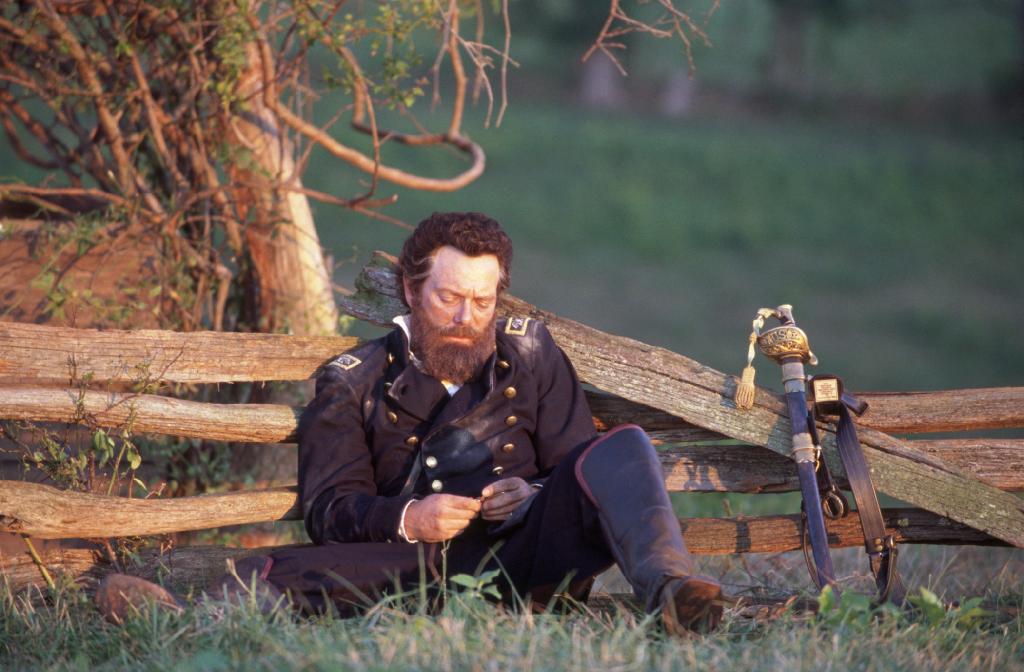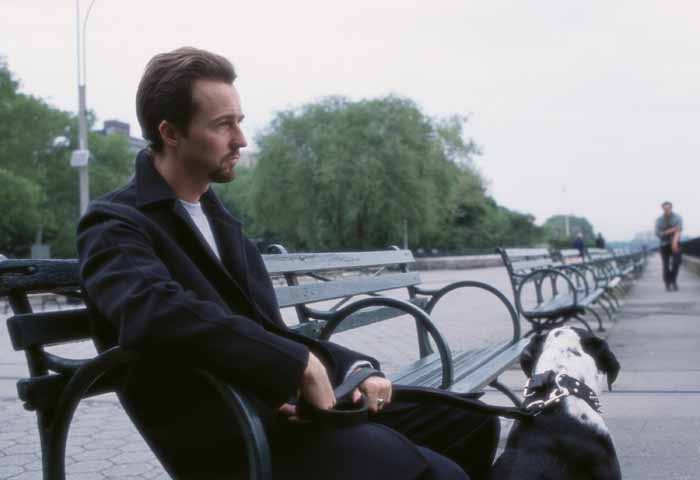Happy New Year, y’all…and I hope everyone had a safe and happy New Year’s Eve. After a hectic past couple of days (which included spending most of my 28th birthday (12/29) driving up the East Coast in holiday traffic and entertaining some old DC friends for a pre-New Years get-together on the 30th), I decided to spend the evening with Berkeley, DoD, and a 4-pack of Guinness. All in all, I quite enjoyed 2002 (Year in Pics), even if the leadership deficit in Washington often seemed despairingly large this past year. But, at any rate, here’s looking to a peaceful, fun-filled, and productive 2003 the world over.
Of course, as in the past two years, a 2003 post means it’s now time for the 2002 Movie Roundup. (As per usual, movies I haven’t seen yet aren’t listed, which this year include The 25th Hour, About Schmidt, Bowling for Columbine, Bloody Sunday, Catch Me If You Can, Confessions of a Dangerous Mind, Far From Heaven, Frida, The Hours, Jackass, The Ring, and Chicago.) So without further ado, my
Top 20 Films of the Year:
1. Lord of the Rings: The Two Towers. No surprise here. Although
Fellowship may have delivered a bigger emotional impact,
Peter Jackson and co. handled massive expectations with aplomb and deftly translated
J.R.R. Tolkien‘s most unwieldy tome (
Silmarillion notwithstanding) into the
action-epic of the year. (Speaking of action-epics, given that both
Braveheart and
Gladiator actually
won Best Picture,
TTT deserves a nomination, if nothing else.) And the creation of
Gollum as the first fully-realized digital character in motion picture history not only stands as an award-worthy breakthrough in bridging special effects and acting, but also as another sad reminder of the disrepute to which the
other fanboy/girl trilogy has fallen. The bar has been raised…again.
2. In the Bedroom. A hold-over from 2001 that I happened to see in the first weeks of 2002. I can’t remember another film this year that resonated so strongly. While I think last year’s award hoopla erred too far toward the histrionics of
Sissy Spacek and away from the nuanced performance of
Tom Wilkinson, the moral center of the film,
In the Bedroom nevertheless powerfully depicts how ostensibly “good” people eventually find themselves contemplating and acting out evil deeds. Plenty of complex and memorable scenes throughout, such as Wilkinson watching the distracted guests at his son’s funeral, or his pained attempt to forge a connection with
Marisa Tomei, a woman he has nothing in common with except loss. A very, very good film that, if anyone has the stomach for a double dose of grief, bookends nicely with
Atom Egoyan‘s
The Sweet Hereafter.
3. About a Boy. A surprisingly good translation of Nick Hornby‘s third book. A bit fluffy, perhaps, and as I noted here I’m not sure how I feel about some of the underlying premises, but very well done nonetheless. After all, making both Hugh Grant and a precocious young British lad palatable at the same time is no easy task.
4. Secretary. A heart-warming romantic comedy about a boy, a girl, and the spankings that brought them together. Both James Spader and Maggie Gyllenhaal are great in this pic, although I’m getting kinda sick of Jeremy Davies (his overly mannered performance in Solaris was distracting too.) While critics are falling all over themselves about the admittedly good Y Tu Mama Tambien for its frank look at sex, I found Secretary the better, and sexier, film of the two. (I thought Y Tu Mama Tambien was more explicit than it was erotic, which is a small difference but a difference nonetheless.) A lot of the people I’ve spoken with had trouble with the ending, but I thought that it ended the only way it really could…any other way would’ve given the audience the out they wanted to condemn these people as sideshow freaks. By treating this bizarre couple as just another relationship in a weird wide world, Secretary offers a portrait of two people “just right” for each other that is much more touching than the average, vanilla romantic comedy.
5. Adaptation. Despite what the sidebar says, I sense this one slipping in my mind while Gangs of New York moves up. Nevertheless, Adaptation was an interesting and fun mind twister for the first two acts (worth the price of admission for the nut muffin reward monologue alone, not to mention Meryl Streep‘s stoned dial tone.) Like Secretary, I see how the movie had to end the way it did, but still…I think there’s something to be said for Stephanie Zacharek’s position that, in a year when some very good adaptations were made (2 of the top 3 here, for example), Kaufman’s self-referential, Hollywood-hating story here is a trifle indulgent. But, for now, it holds the five spot.
6. Spiderman. Probably the second-best foray in yet another lousy crop of summer films (after Minority Report), but at first viewing much more fun than Spielberg’s film. Spidey was a great movie for the first hour, but got a bit perfunctory in the second. On the plus side, I don’t think you could have handled the origin story (or J. Jonah Jameson, for that matter) any better, but the Green Goblin still seems grossly misconceived. (Casting Willem DaFoe, who looks just like the Goblin without the mask on, and then fitting him with a static, sterile green faceplate, is just a mistake of monumental proportions.) And I’m still not too big on Kirsten Dunst as MJ – she screams Gwen Stacy at me. But, fanboy issues aside, Sam Raimi‘s movie was still probably the most satisfying summer film this year.
7. Gangs of New York. I find my thoughts dwelling on this one, so much so that I’m probably going to end up seeing it again. Ultimately, I think Gangs is an almost-great but deeply-flawed film. When you see Daniel Day-Lewis, Jim Broadbent, Liam Neeson, John C. Reilly, or the wonderful recreation of Five Points, you get a sense that this could be one for the ages. But then the film just flounders around for too long with no sense of purpose, other than a meager and barely compelling revenge story. Scorsese‘s beautiful tracking shot of Irish immigrants disembarking in NY harbor and promptly entering the Union army (as coffins are unloaded from nearby ships) gives you a sense of how amazing this film could have been. But, most of the time, you’re just wondering how much longer it’s going to take for Amsterdam DiCaprio to get his act together. And the draft riots issues have already been discussed at length here.
8. Solaris. Like GONY, this film feels like a missed opportunity (and like GONY, I would very much like to see the rumored 45-minute-longer cut.) I liked Solaris more than most people I’ve talked to, but in the end it seemed a bit narrowly conceived. It was a very interesting rumination on relationships and memory – you ultimately know and love the stylized people created in your head more than the actual persons in front of you – but after awhile, I felt like shaking George Clooney and saying “Look, I know it’s weird to see your dead wife again and all, but there’s an alien intelligence trying to communicate with you outside the ship.” That sense of wonder that should have accompanied much of the film is lost by the time Clooney arrives on the space station. And like I said before, Jeremy Davies is distracting.
9. Minority Report. This film was probably the best of the summer movies, even if Spiderman was more satisfying. I liked the brooding atmosphere of this film – if anything, Spielberg‘s vision here makes AI look better too. But, sadly, the film completely falls apart at the end. As I said here, I’m of the school that everything that happens after Tom Cruise is placed in Tim Blake Nelson‘s jail is a Brazil-like vision. This view might explain the ending but, if the picture were better, it wouldn’t need explaining.
10. Y Tu Mama Tambien. As noted above, I think this film is getting overrated in many critics’ end-of-year lists, but it was still quite good. Like Secretary, the way sex is handled in the picture makes your realize how cartoonish it’s become in most American films (where, as Ebert notes here, the closest thing one gets to mature handling of sexual themes is in throwaway garbage like American Pie.) And Maribel Verdu makes for a intriguing Mrs. Robinson of sorts. But, to me much of the voice-over throughout, and particularly in the “two years later” final scene, was hamhanded. For example, when our trio is driving through Mexico and pass a car wreck which is then contextualized by our Amelie-esque narrator, I was completely taken out of the picture. Good, but not as good as it’s currently being made out to be.
11. Blade 2: Bloodhunt. A popcorn film that delivered on exactly the level I wanted it to, from iconic Reservoir Dogs-type shots of Blade and the Bloodpack to an Aliens-like “we’re not all going to make it” rampage in the sewers of Prague. There’s no scene in the movie as good as the meatpacking plant vampire rave that kicks off the first film, but that’d be a hard moment to top anyway. Well-done throughout as a bubble-gum, comic book movie.
12. Below. Speaking of popcorn flicks, David Twohy‘s Below got undeservedly buried by Dimension films when, at least for the first hour and a half, it was quite a spooky ghost story in the Twilight Zone tradition. Like Minority Report, it completely fell apart in the end, of course, but I always like to see Bruce Greenwood and Olivia Williams get some work, and Holt McCallany‘s scene in the mirror still gives me the shivers.
13. The Bourne Identity. Another surprise. While the new Bond flick only stayed intriguing for the first thirty minutes or so, this film managed to hold my interest throughout. Matt Damon is believable, Chris Cooper and Brian Cox do excellent character work here, and Franka Potente and Clive Owen help lend the film an authentic European flavor that’s gone completely AWOL over in the Bond series. (Sadly, though, Columbia’s own Julia Stiles seems grossly miscast.) If the first film’s any indication, I’d rather see another Bourne than another Bond.
14. Undercover Brother. For that matter, I’d rather see another Brother than another Bond too. An Austin Powers ripoff, perhaps, but I found it funnier than Goldmember. The scene with Doogie testing Eddie Griffin‘s grasp of whiteness by asking him Friends trivia was a classic in and of itself.
15. Blue Crush. Laugh if you want, but Blue Crush was a surprisingly solid grrl power film, with appealing characters, realistic interactions, and beautiful Hawaii scenery. The 8 Mile for the X-Games set, Blue Crush was a much better film than I had expected, even if some of the CGI surfing effects are pretty lame. Extra points for the Blestenation hip-hop remix of Bananarama’s “Cruel Summer,” which really should have been the summer joint of 2002.
16. Insomnia. Like Minority Report and Below, Christopher Nolan‘s third effort starts well but peters out by the end. I liked it, but didn’t find Al Pacino half as good as everyone made him out to be. As for Robin Williams, he’s good in this, as he was in the rather stilted One Hour Photo, but you don’t get points for simply not being zany. An ok film that falls in the rankings for the insipid ending and for wasting the lovely Maura Tierney.
17. 8 Mile. It’s Rocky for skinny white guys! Flashdance without the welding! Yeah, this film is predictable, but like Curtis Hanson‘s earlier Wonder Boys, it evokes an air of authenticity that carries the picture through its rough spots. I particularly liked the banter between “Rabbit” and his friends, even if some of them, most notably Sol (Omar Miller, the big tubby playa) and DJ Iz (De’Angelo Wilson, the earnest black power guru) seem like direct lifts of Stacy and Sharif from the much-better Menace II Society. And, although he’s pretty good in this film as himself, I still can’t really see Eminem having much of a movie career, even if his name was being bandied about for Bruce Wayne in Batman: Year One.
18. Austin Powers in Goldmember. Goldmember wasn’t bad, either. In fact, I liked it more than the second one and found the character of Goldmember inexplicably funny (must have been the youth in Belgium.) That being said, Mike Myers is still throwing the kitchen sink at you in these films. It’d be a better film if some of the unfunnier stuff was pared down.
19. Amelie. An interesting update on the romantic comedy and assuredly a better Jeunet film than Alien: Resurrection, but in the end it left me a bit cold. Would you really want this doe-eyed French girl interfering in your life the way she so often does? I doubt it. The “new” letter from the long-dead husband seems particularly jarring.
20. Red Dragon. A completely unnecessary film, tantamount to remaking Silence of the Lambs with Ed Norton as Clarisse. That being said, it was much better than Ridley Scott’s bloated, boring Hannibal, and there is plenty of good character work here, particularly from Ralph Fiennes, Emily Watson, Harvey Keitel, and Phillip Seymour Hoffman.
Biggest Disappointments: Road to Perdition, Signs, and, yes, Star Wars Episode II: Attack of the Clones.
Most Annoying Phenomenon: My Big Fat Greek Wedding All I can say is, been there, done that.
Best Actor: Daniel Day Lewis, Gangs of New York. Runner-Up: Tom Wilkinson, In the Bedroom
Best Actress: Maggie Gyllenhaal, Secretary. Runner-up: Maribel Verdu, Y Tu Mama Tambien
Best Supporting Actor: Andy Serkis, LOTR: The Two Towers. Runner-Up: Jim Broadbent, Gangs of New York.
Best Supporting Actress: Meryl Streep, Adaptation. Runner-up: Toni Collette, About a Boy.
And, finally, here’s to 2003, a year which will witness a Hulk, two Matrices, and hopefully the biggest baddest epic of them all, Lord of the Rings: Return of the King.

